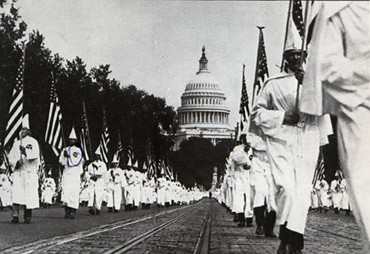
KKK marching in DC in 1925
The defining characteristic of Sinclair Lewis' fictional fascist USA is brutal violence directed against any opposition and against scapegoats.
In It Can't Happen Here, frustrated, angry men (and a few token women) who have lost their livelihoods because of economic dislocation and who have lost their hope in conventional politics because Roosevelt's Democrats elected in 1932 didn't deliver, turn to a demagogue for hope. Organized first as the League of Forgotten Men by Bishop Prang, these morph into "Minute Men." And in the crucial turning point of the novel, they discover how much they enjoy killing.
New President Buzz Windrip announces immediately after his inauguration that he will rule without Congress and imprisons those Congressmen who resist.
The recalcitrant Congressmen had been penned in the District Jail. Toward it, in the winter evening, marched a mob that was noisily mutinous toward the Windrip for whom so many of them had voted. Among the mob buzzed hundreds of Negroes, armed with knives and old pistols, for one of the kidnapped Congressmen was a Negro from Georgia, the first colored Georgian to hold high office since carpetbagger days.
Surrounding the jail, behind machine guns, the rebels found a few Regulars, many police, and a horde of Minute Men, but at these last they jeered, calling them "Minnie Mouses" and "tin soldiers" and "mama's boys.". . . Half-a-dozen policemen with guns and night sticks, trying to push back the van of the mob, were buried under a human surf and came up grotesquely battered and ununiformed--those who ever did come up again. There were two shots; and one Minute Man slumped to the jail steps, another stood ludicrously holding a wrist that spurted blood.
The Minute Men--why, they said to themselves, they'd never meant to be soldiers anyway--just wanted to have some fun marching! … That instant, from a powerful loudspeaker in a lower window of the jail brayed the voice of President Berzelius Windrip:
. . ."I tell you that you are, ever since yesterday noon, the highest lords of the land--the aristocracy--the makers of the new America of freedom and justice. Boys! I need you! Help me--help me to help you! Stand fast! Anybody tries to block you--give the swine the point of your bayonet!"
A machine-gunner M.M., who had listened reverently, let loose. The mob began to drop, and into the backs of the wounded as they went staggering away the M.M. infantry, running, poked their bayonets. Such a juicy squash it made, and the fugitives looked so amazed, so funny, as they tumbled in grotesque heaps!
The M.M.'s hadn't, in dreary hours of bayonet drill, known this would be such sport.
Windrip's USA becomes a vicious prison of random violence, lethal to Jews and Blacks, dangerous to any who cross the newly empowered angry M.M.s.
Every moment everyone felt fear, nameless and omnipresent. They were as jumpy as men in a plague district. Any sudden sound, any unexplained footstep, any unfamiliar script on an envelope, made them startle; and for months they never felt secure enough to let themselves go, in complete sleep. And with the coming of fear went out their pride.
Lewis may have written a preachy, unfashionably engaged novel that disappoints admirers of literature, but in passages such as these he uses all his gifts to describe all too familiar human behaviors.
Contemporary US society certainly has some echoes of Lewis' fictional dystopia. We suffer from an ample supply of angry white men who feel that somehow they aren't getting their due -- pollster Stanley Greenberg calls them the "F-You Boys" and estimates they make up 13 percent of the population as well as a significant part of the Republican base. And we have contemporary Minutemen playing vigilante on the US border with Mexico, holding off the Brown hordes. (By the way, Lewis' fascist USA invades Mexico to keep up its martial spirit when enthusiasm for the Windrip's Corpo state begins to wane.) But we also live in a country where an Eric Rudolph (the abortion clinic and Olympic bomber) does go to jail and we execute a Timothy McVeigh -- political violence with impunity is not yet the order of the day.
The main locus of violence in US society today is far from the F-You boys and our home grown fascists. Whole communities, mostly Black and brown, are war zones, where young people are brutalized and can't count on growing up. Recently a 16-year old girl randomly cut the throat of a retired white woman in an upscale Berkeley neighborhood. The local media went berserk -- how could such a thing happen? San Francisco Chronicle columnists Joan Ryan wrote a column delving more deeply into the crime:
Walter Jackson, an assistant district attorney in the Alameda County juvenile department, is prosecuting the case. Susan Walsh works on the other side of the aisle; she is in charge of the public defenders in the juvenile department. They agree that the most unsettling aspect of this case is the fact we think it is unusual. Or that we think it has anything to do with evil.
The only thing unusual about this case, they say, is its location. There hasn't been a violent attack in that Berkeley neighborhood for as long as anyone can remember. But this girl seems like so many of the low-income, neglected, mentally ill kids Jackson and Walsh see every day.
"If you sat in Juvenile Court, you would see tragic stories just like this one every day,'' Walsh said.
Certainly we have to fear the violent posturing of the wingnut faction of the Republican right, but also this society must find a way to help these children growing up in circumstances where order and law are a joke.
No comments:
Post a Comment